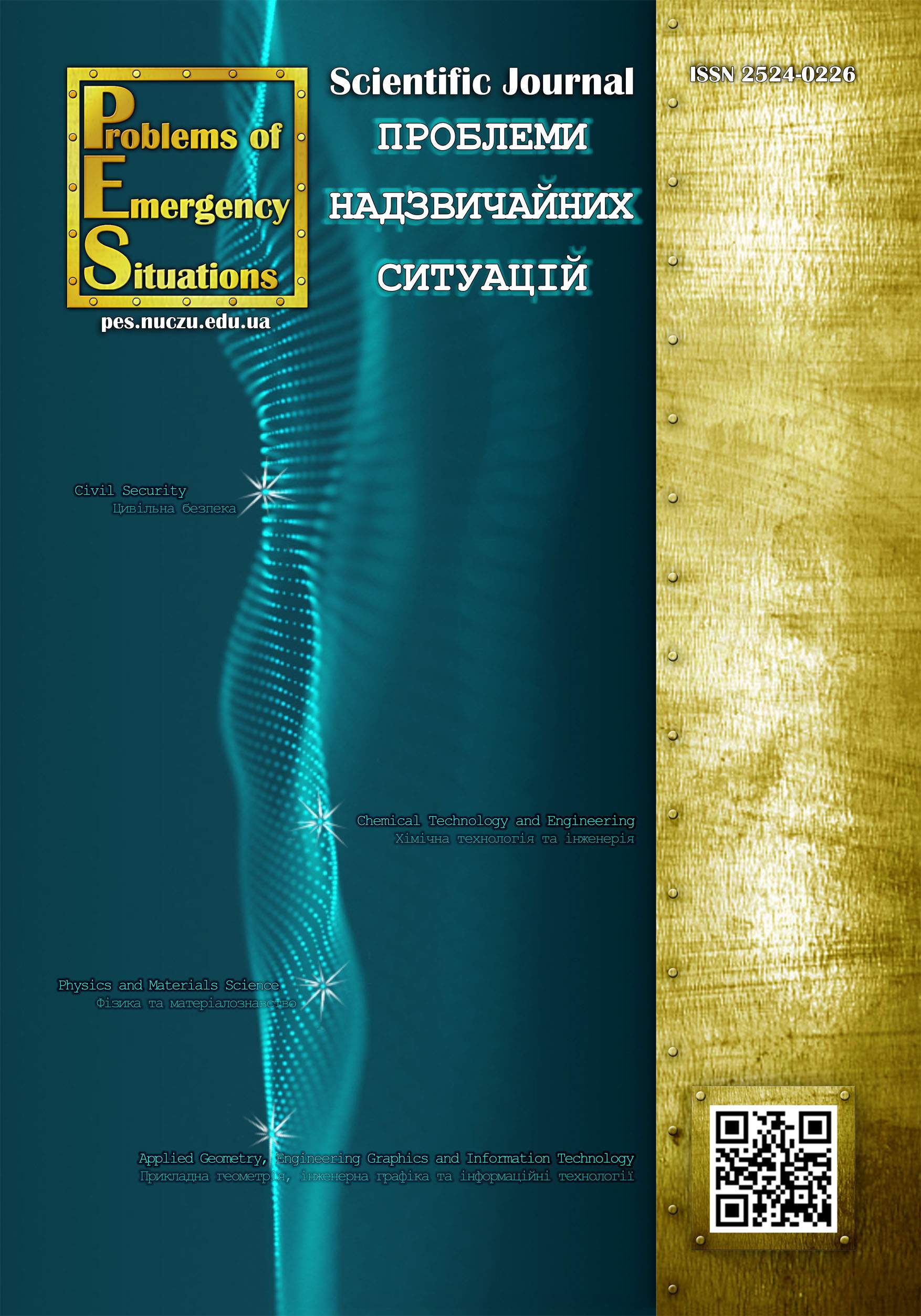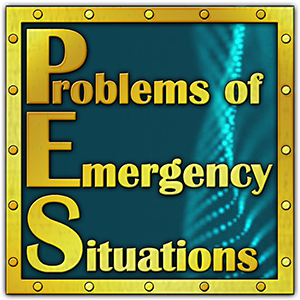Implementation of the method of preventing emergency situations due to fire through fire forecasting
Boris Pospelov
National University of Civil Defenсe of Ukraine
http://orcid.org/0000-0002-0957-3839
Evgeniy Rybka
National University of Civil Defenсe of Ukraine
http://orcid.org/0000-0002-5396-5151
Mikhail Samoylov
National University of Civil Defenсe of Ukraine
http://orcid.org/0000-0002-8924-7944
Ruslan Meleschenko
National University of Civil Defenсe of Ukraine
http://orcid.org/0000-0001-5411-2030
Yuliiy Bezuhla
National University of Civil Defenсe of Ukraine
http://orcid.org/0000-0003-4022-2807
Оlexander Yashchenko
National University of Civil Defenсe of Ukraine
http://orcid.org/0000-0001-7129-389X
DOI: https://doi.org/10.52363/2524-0226-2022-36-3
Keywords: emergency situation, fire, air environment parameters, intelligent subsystem, fire forecasting
Аnnotation
A general scheme for the implementation of the method of preventing emergency situations due to fires in buildings and structures based on the prediction of fires in the form of an intelligent system has been developed. The system consists of three interrelated subsystems - a subsystem of current measurement of dangerous parameters of the indoor air environment, a subsystem of intelligent forecasting of fires in premises, and a subsystem of implementing operational management decisions regarding the elimination of fires. The general scheme of the proposed system covers the air environment of the premises, the relevant characteristics of the danger state of which are used to predict fires. Current data from the subsystem of current measurement of dangerous parameters of the state of the indoor air environment are the information basis of the intelligent fire forecasting subsystem. These data reflect current information about the state of the environment in specific premises that are dangerous from the point of view of the occurrence of fires in them. The intelligent fire forecasting subsystem allows you to identify dangerous premises where a fire is likely to occur and to generate special warning signals about the possibility of a fire and to transmit them to the subsystem for the implementation of operational management decisions. The scheme of the subsystem of the current measurement of dangerous parameters has been developed, which allows obtaining current information about the state of the environment in specific premises that are dangerous from the point of view of the possibility of fires occurring in them. The subsystem for the implementation of operational management decisions has at its disposal the necessary resource for the implementation of measures to eliminate fires in premises and to prevent the occurrence of emergency situations due to fires.
References
- Reproduced with permission from Fire Loss in the United States During 2020 (2021). National Fire Protection Association, 11. URL: www.nfpa.org
- Otrosh, Yu., Semkiv, O., Kovalov, A. (2019). About need of calculations for the steel framework building in temperature influences conditions. IOP Conference Series: Materials Science and Engineering, 708, 1, 012065
- Pospelov, B., Andronov, V., Rybka, E., Meleshchenko, R., Borodych, P. (2018). Studying the recurrent diagrams of carbon monoxide concentration at early ignitions in premises. Eastern-European Journal of Enterprise, 3/9 (93), 34–40. doi: https://doi.org/10.15587/1729-4061.2018.133127
- Andronov, V., Pospelov, B., Rybka, E., Skliarov, S. (2017). Examining the learning fire detectors under real conditions of application. Eastern-European Journal of Enterprise Technologies, 3 (9 (87)), 53–59. doi: https://doi.org/10.15587/1729-4061.2017.101985
- Ahn C. -S., Kim J. -Y. (2011). A study for a fire spread mechanism of residential buildings with numerical modeling. WIT Transactions on the Built Environment, 117, 185–196. doi:10.2495/SAFE110171
- Recurrence plots and their quantifications: expanding horizons. International Symposium on Recurrence Plots, Grenoble, France, 17-19 June 2015, 380.
- Poulsen, A., Jomaas, G. (2011). Experimental study on the burning behavior of pool fires in rooms with different wall linings. Fire Technology, 48 (2), 419–439. doi: https://doi.org/10.1007/s10694-011-0230-0
- Zhang, D., Xue, W. (2010). Effect of heat radiation on combustion heat release rate of larch. Journal of West China Forestry Science, 39, 148.
- Ji, J., Yang, L., Fan, W. (2003). Experimental study on effects of burning behaviours of materials caused by external heat radiation. JCST, 9, 139.
- Peng, X., Liu, S., Lu, G. (2005). Experimental analysis on heat release rate of materials. Journal of Chongqing University, 28, 122.
- Andronov, V., Pospelov, B., Rybka, E. (2017). Development of a method to improve the performance speed of maximal fire detectors. Eastern-European Journal of Enterprise Technologies, 2 (9 (86)), 32–37. doi: https://doi.org/10.15587/1729-4061.2017.96694
- Pospelov, B., Andronov, V., Rybka, E., Skliarov, S. (2017). Design of fire detectors capable of self-adjusting by ignition. Eastern-European Journal of Enterprise Technologies, 4 (9 (88)), 53–59. doi: https://doi.org/10.15587/1729-4061.2017.108448
- Bendat, J. S., Piersol, A. G. (2010). Random data: analysis and measurement procedures. John Wiley & Sons. doi: https://doi.org/10.1002/9781118032428
- Shafi, I., Ahmad, J., Shah, S. I., Kashif, F. M. (2009). Techniques to Obtain Good Resolution and Concentrated Time-Frequency Distributions: A Review. EURASIP Journal on Advances in Signal Processing, 2009 (1). doi: https://doi.org/10.1155/2009/673539
- Singh, P. (2016). Time-frequency analysis via the fourier representation. HAL, 1–7.
- Pretrel, H., Querre, P., Forestier, M. (2005). Experimental Study Of Burning Rate Behaviour In Confined And Ventilated Fire Compartments. Fire Safety Science, 8, 1217–1228. doi: https://doi.org/10.3801/iafss.fss.8-1217
- Stankovic, L., Dakovic, M., Thayaparan, T. (2014). Time-frequency signal analysis. Kindle edition, Amazon, 655.
- Avargel, Y., Cohen, I. (2010). Modeling and Identification of Nonlinear Systems in the Short-Time Fourier Transform Domain. IEEE Transactions on Signal Processing, 58 (1), 291–304. doi: https://doi.org/10.1109/tsp.2009.2028978
- Pospyelov, B. B., Rybka, E. O., Samoylov, M. O., Bezuhla, Yu. S., Yashchenko, O. A., Veretennikova, Yu. A. (2021). Metod zapobihannya nadzvychaynym sytuatsiyam vnaslidok pozhezh shlyakhom korotkochasnoho prohnozuvannya zahoryanʹ. Problemy nadzvychaynykh sytuatsiy, 34, 295–308.
- Systema rannʹoho vyyavlennya nadzvychaynykh sytuatsiy. (2019). Patent № 139221 UA. № 201906486; decl. : 10.06.2019; published: 26.12.2019, Bul. № 24. Retrieved from:
- Stanton, C. (2014). Getting to know Arduino: Part 1. Hello, world!. Available at: http://www.element14.com/community/groups/arduino/blog/ 2014/03/28/getting-to-know-arduino-part-1-hello-world
- Marian, P. (2015). Sen-1327 LPG gas sensor module. Available at: http://www.electroschematics.com/6669/sen-1327-lpg-gas-sensor-module
- Wiki, G. (2014). Arduino GPRS Shield. Available at: http://www.geeetech.com/wiki/index.php/Arduino_GPRS_Shield
- Adaptyvnyy sposib vyyavlennya pozhezhi. (2021). Patent № 149701 UA. №202103376; decl. : 15.06.2020; published: 01.12.2021, Bul. № 48. Retrieved from: https://base.uipv.org/searchINV/search.php?action=viewdetails&IdClaim=279430
- Pospelov, B., Andronov, V., Rybka, E., Samoilov, M., Krainiukov, O., Biryukov, I., Butenko, T., Bezuhla, Y., Karpets, K., Kochanov, E. (2021). Development of the method of operational forecasting of fire in premises of objects in real conditions. Eastern-European Journal of Enterprise Technologies, 2 (10 (110)), 43–50. doi: https://doi.org/10.15587/1729-4061.2021.226692














